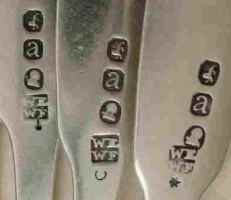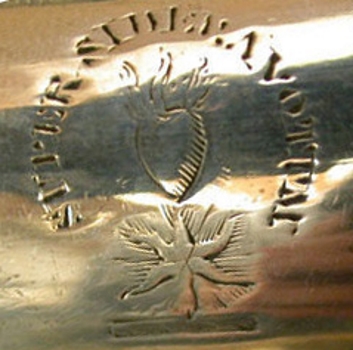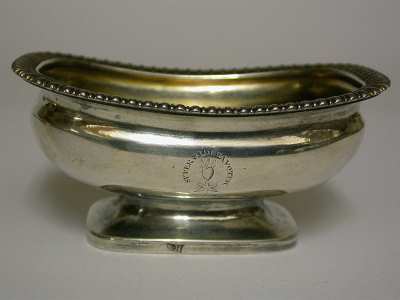 newsletter
# 146 July 2016
newsletter
# 146 July 2016www.ASCASonline.org SITE MAP
email: silverassociation@yahoo.it
YOUR GUIDE TO JULY NEWSLETTER: articlesnew members members' windowmail to ASCAS replies to questions a page per month a silversmith per month a word per month a book on my shelf a crest per month contributors to this Newsletter search engine disclaimer and privacy policy A new article for ASCAS website
Maurice Meslans presents:
|
top page - page map |
Mail to ASCAS: e-mail
silverassociation@yahoo.itDani Boyd writes:
... I'm trying to identify the maker of this religious icon. It is signed 'Bola' has the boar's head & a maker's mark that looks like L L.
In between the two L is what appears to be a bell.
I was wondering if you could help me identify the maker
Thank you
Dani Boyd
The maker is Langlois Lucien, 7 Rue Réaumur, Paris, active 1890/1921, see my website at http://www.silvercollection.it/frenchsilversmithsLDUE.html
Giorgio Busetto
Andrew Brasch writes:
... Can you help with the details of this German silver mark?
Thanks
Andrew Brasch
The maker is Sohnlein Karl & Sohne, Hanau , see my website at http://www.silvercollection.it/GERMANMAKERSHUMAN.html
Giorgio Busetto
Luigi Masciullo writes:
... I'm trying to obtain information about the marks of these silver "cartagloria" (prayer sheets). They bear the "leone in moleca" mark of the Republic of Venice but I'm unable to identify the assayer and the maker
Thanks
Luigi Masciullo
The mark 'ZC a castle in between' belongs to Sazador in Zecca (assayer) Zuanne Cottini, active from 1712 to 1736.
This punch is documented together with the maker's mark DB belonging to an unidentified Venetian silversmith of the 18th century.
Giorgio Busetto
Malcolm Underwood writes:
... I have acquired what I believe to be a silver spirit measure. I am not able to identify the maker mark or the date stamp and would invite any member who has previously seen such marks to help me identify the piece.
It is 53 high and 43 dia, engraved with a warrior holding a sword in his Right hand and a severed head in his left hand. The hallmarks are foreign to me and I would appreciate any help in identification of the piece.
Thanks
Malcolm Underwood
Replies to questions
Geldolph Everts
receives these answers about his silver spoon
(see June 2016 Newsletter)
Peter van Oel writes
Not Dutch but British spoons made in London (crowned Leopard head), the fourth spoon maker's mark; TC on top of WC for Thomas & William Chawner known flatware makers, this particular mark seen 1764-1769. Marks not found in existing registers; they may have been recorded in the missing 1758-1773 Large workers' Register.
The other three spoons are also London made, maker's mark E.C in script letters for Ebenezer Coker, registered june 1739, this particular mark used/seen 1745-1757-1759.
Peter van Oel
"A PAGE per MONTH"
In this column we presents a page obtained from makers'
brochures, books, auction catalogs, advertising or whatever
other printed paper, related to silver, that may be of interest
for ASCAS members.
The images will be published at a "low resolution" level and for
private and personal use only.
This column is published under the kind permission of Giorgio
Busetto's website
"A WORD per MONTH"
In this column we present an abstract from a page of the "What is? Silver Dictionary"courtesy of
 |
HOW TO READ ENGLISH / BRITISH STERLING SILVER MARKS
|
"A SILVERSMITH per MONTH"
In this column
we present marks, information and history of silversmiths and
silver manufacturers.
This column is published under the kind permission of Giorgio
Busetto's website

HENNELL FAMILY
DAVID HENNELL (I) - ROBERT HENNELL (I) - DAVID HENNELL (II) - ROBERT HENNELL (II) - SAMUEL HENNELL - ROBERT HENNELL (III) - ROBERT HENNELL (IV) - JOHN BARCLAY HENNELL
The founder of "Hennell dynasty" was David Hennell (I) (1712-1785), apprenticed to Edward Wood in 1728.
|
"A CREST per MONTH"
In this column we
present images and descriptions of Crests and Mottoes of British,
Irish and Scottish families as engraved on silver items.
This column is published under the kind permission of Giorgio
Busetto's website

FAMILY CRESTS: LIST OF NAMES
ILLUSTRATED DIRECTORY OF FAMILY CRESTS
Closing our July 2016 edition of ASCAS Newsletter I hope
you have appreciated its content.
Your comments, suggestions and advice will be of great help.
My thanks to Dani Boyd, Andrew Brasch, Janjaap Luijt, Luigi Masciullo, Maurice Meslans and Malcolm Underwood for their precious contributions.
Giorgio Busetto
Secretary
DISCLAIMER AND PRIVACY POLICYASCAS is a community of people having a common
interest in antique silver.
|




















